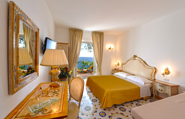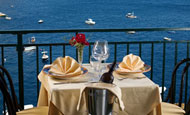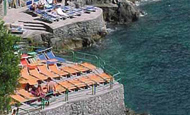PRAIANO

Praiano is set like a diamond in an enchanting location, nestled among the beautiful inlets of the breathtaking Amalfi coast, a mere seven kilometers from Positano and six kilometers from Amalfi.
Once an ancient fishing village, today it is a prestigious seaside resort.Praiano, known for its fine climate and excellent facilities, presents itself to the sea as a cascade of white houses on a green, flowering slope.
To the west, the village of Vettica Maggiore is a charming site for a seaside sojourn. An old local adage says "Chi vuol vivere sano, la mane a Vettica, la sera a Praiano". The prescription is clear: for a healthy life, morning hours must be spent in Vettica and evenings in Praiano. Here you'll find the secrets of local vitality and love of life.The coastal towers, dramatic symbols of the past, are characteristic of Praiano, one of the most famous resorts of the Amalfi coast. It is a favourite destination for visitors who love to enjoy nature in all its original splendor.
 The
Hotel Onda Verde and it's surroundings are artistically represented in
the background by
Paul Sandulli.
The
Hotel Onda Verde and it's surroundings are artistically represented in
the background by
Paul Sandulli.
Praiano, originally known as Plagium or Pelagianum, was once the holiday resort of the Amalfitan Doges. Today it may lack the splendour of Medieval nobility, but it has maintained its timeless charm as a small fishing village perched on the cliffs between its more famous neighbours, Positano and Amalfi. For its defense a tower was built by Charles I of Anjou. Praiano’s local economy was built upon two products, the first being the production of silk, and its use by the local women in the manufacture of handmade articles for clothing etc. In past centuries silk and thin, fine yarn was turned white and worked by the women of the town, and the popularity of this fabric helped the town flourish. The coral fishing industry was no less lucrative, and the men collected coral from the sea and fashioned it into beautiful jewelry, among other things.
 Both
historically and architecturally, the most important building today in
Praiano is the Church of Saint Luke the Evangelist, which also holds this
saint's remains. The Church boasts fine paintings by Giovanni Bernardo
Lama (including the Madonna with Child) and a silver bust of the saint,
dated 1694.
Both
historically and architecturally, the most important building today in
Praiano is the Church of Saint Luke the Evangelist, which also holds this
saint's remains. The Church boasts fine paintings by Giovanni Bernardo
Lama (including the Madonna with Child) and a silver bust of the saint,
dated 1694.
Today Praiano is a prestigious sunning, swimming and boating destination, offering tourists from all over the world a tranquil location from which to sample the joys of the coastline, with convenient proximity to the tourist towns of Positano, Amalfi, and Ravello.
Both historically and architecturally, the most important building today in Praiano is the Church of Saint Luke the Evangelist, which also holds this saint's remains. The Church boasts fine paintings by Giovanni Bernardo Lama (including the Madonna with Child) and a silver bust of the saint, dated 1694.
Today Praiano is a prestigious sunning, swimming and boating destination, offering tourists from all over the world a tranquil location from which to sample the joys of the coastline, with convenient proximity to the tourist towns of Positano, Amalfi, and Ravello.
ENVIROMENT RESOURCES - WHAT TO SEE
 St.MARIA DEL CASTRO CHURCH AND CONVENT
St.MARIA DEL CASTRO CHURCH AND CONVENT
These were built by Dominican Fathers in 1599; the convent was suppressed
at the end of XVIIth cen. It has been recently restored together with the church thanks to
the monks stong work.
St.LUCA EVANGELISTA CHURCH
Saint Luca’s remains are kept here, a silver bust of him from 1694
and canvases attributed to 16th century painter Giovanni Bernardo Lama. Madonna
del Rosario by Padovano di Montorio, dated 1572, is situated in a chapel on the right of
altar. The interior of the church, restored in 1772, has three naves divided by pillars
supporting beautiful rounded archs.
Also very interesting are: a wood pulpit with paintings representing St. Pietro and St.
Paolo, major altar in '1700 majolica and the floor with birds, flowers and St. Luca are
painted. To the right of the church is the three story belfry and the "monofore.
St.GENNARO CHURCH
Situated in Vettica Maggiore near La Statale and visible from the sea, St.
Gennaro church is an often photographed landmark of Praiano. Of ancient foundation, it was
restored in 1602. It presents three naves with transept dominated by an oval cupola,
covered by multicolored tiles. The belfry has a high octagonal coping finished with a
little majolica cupola. Inside one will admire the Assumptions of 1696 and St.
Bartolomeo’s martyrdom, by Giovan Bernardo Lama and the Holy Family of the end of
XVIth century.

GRADO A VETTICA DI PRAIANO COAST TOWER
This ancient Viceroyal tower visible from Positano was built to guard
against sea invaders, and has recently been transformed into a private house.
SCIOLA COAST TOWER Another coastal tower, this one built in the Angevin age on a circular plant and transformed during Spanish reign, using the base part of medieval building. This tower is seen at the left of the hotel in several photos on our website and is a very short walk from the hotel.
The wooded territory of the town of Praiano extends for about 30 hectares; the largest is named "il Campo" (the Field), and extends up the Fontanelle valley, where St. Domenico church and convent are sited; it is possible to reach it by a recently restored flight of steps.
Praiano does not lie directly on the coast, but parallel to the sea, and for a long stretch, upwards and downwards of the state road. Scattered houses which at intervals gather and spread over the countryside. Now and then a "scalinatella" (a flight of little steps) winds up among the houses and then goes downwards to the high and impassable coast, among the lemon terraces and through the Mediterranean blooming bush. Here and there, a little creek, a little beach, a Paradise corner, as for example the seashore of Praia, the only real landing-place of this steep coastal stretch. Praiano is a farmers' village with a great past: it was the seat of an Angioin University, the summer residence of the Amalfi doges and even the production place of precious cloths. That is why it economically prospered and developed even though not completely, because of the prevalence of Amalfi in its neighbourhood.
Not unlike the other coastal villages, then, Praiano shared the decline of the powerful Sea Republic till it knew the bitter poverty of the last centuries and of the beginning of the 20th century. Then, tourism, at first the tourism of great travellers, then the tourism of common Italian and foreign travellers, developed.
The Night Club "L'Africana", which can be approached by a path excavated in the rock dropping to the sea, was the seat of a cultural meeting-place in the Fifties and in the Sixties. The memory of the merry nights of dancers and singers, of the short-lived and passionate loves of actresses and latin lovers is still alive....
Feste e tradizioni popolari
S. Luca Evangelista patrono di Praiano si festeggia nella prima decade di luglio (festa estiva) e il 18 ottobre (festa patronale).
S. Gennaro patrono di Vettica Maggiore viene festeggiato la prima domenica di maggio e il 19 settembre. Si è tramandato che gli antichi abitanti chiamavano il santo Patrono "S. Gennaro 'o patanaro" oppure " S.Gennaro 'o poveriello" detto così perché s'intendeva ringraziare il Santo per il buon raccolto delle patate, che costituiva una risorsa economica e alimentare per tutte le famiglie, sebbene fosse un alimento povero.
| Hotels in Praiano | |
|---|---|
|
Hotel Smeraldo Tel. +39.089.874002 Fax. +39.089.874589 |
Hotel Casa Angelina Tel. +39 089 813 13 33 Fax. +39 089 87 42 66 |
|
Grand Hotel Tritone Tel. +39.089.874333 Fax. +39.089.813024 |
Hotel Villa Bellavista Tel. / Fax. +39 089.874054 |
|
Hotel Le Sirene Tel. +39 089.874013 |
Hotel Continental Tel. +39 089.874084 Fax. +39 089.874779 |
|
Hotel Onda Verde Tel. +39 089.874143 / +39 089.874125 Fax +39.089.8131049 contatti |
Hotel Tramonto d'Oro Tel. +39 089.874955 Fax. +39 089.874670 |

























